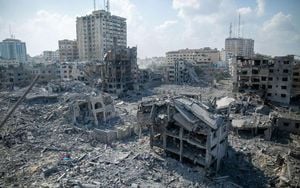Days before the 86th anniversary of Kristallnacht, which saw the destruction of Jewish property and the beginning of mass anti-Jewish violence across Germany, the city of Amsterdam witnessed attacks against Israeli soccer fans. The atmosphere became dangerously charged following these assaults, leading prominent political figures to demand immediate attention from Dutch authorities. Two influential Jewish lawmakers from Florida, Democrat Jared Moskowitz and Republican Randy Fine, condemned the violence, labeling it as akin to historical pogroms, events characterized by brutal and organized anti-Jewish rioting.
The incident took place after the Europa League match between Maccabi Tel Aviv and Ajax, when fans were ambushed by groups of youthful assailants on scooters. The Israeli embassy reported the distressing episodes, with fans experiencing physical harassment and assault. Footage on social media revealed frightening moments when one intruder shouted 'Free Palestine' as he struck an Israeli supporter. Further images depicted another individual, seemingly non-Jewish, getting beaten regardless of his declarations, highlighting the indiscriminate nature of the violence perpetrated against those perceived to be associated with Israel.
The terms 'pogrom' and its historical relevance were not lost on Moskowitz, who took to social media expressing outrage at the apparent lack of police intervention during these violent incidents. He demanded accountability from the authorities and questioned, "Where are the police? Just allowing Jews to be hunted and beaten in the streets." His appeals resonate with historical lessons learned from past atrocities.
Fine echoed similar sentiments and linked the attacks to broader sociopolitical issues, going so far as to blame cultural factors he identified as problematic. Expressing deep vexation, he indicated he would reach out to the Consul General of the Netherlands and warned of potential repercussions if the situation was not adequately addressed, referring ominously to what he called the '#MuslimProblem.' His comments, steeped as they were in tensions surrounding immigration and national identity, helped spotlight the complex and often contentious backdrop of these incidents.
A key moment during this crisis was the involvement of Dutch political figures. Geert Wilders, known for his far-right stances, expressed solidarity with the victims. He urged authorities to take decisive action against those involved, demanding arrests and deportations, calling those who assaulted Maccabi Tel Aviv fans "multicultural scum." Such language highlights the polarizing political rhetoric often surrounding discussions of immigration and cultural integration within Europe.
Notably, this violence occurred against the backdrop of rising tensions related to the Israeli-Palestinian conflict, which had surged recently. Just days before the attack, pro-Palestinian protests had spread across the city. Despite the authorities banning certain demonstrations to prevent clashes, videos surfaced showing Israeli fans chanting aggressive slogans directed at Arabs. The murky timeline of these anti-Arab chants, whether they occurred before or after the assaults, complicates the narrative of blame, indicating both sides were embroiled in rising hostility.
Following the attacks, several arrests were made. Dutch authorities confirmed they detained 63 individuals, with 10 remaining behind bars as the investigation unfolded. Medical reports revealed injuries among Israeli supporters, with five requiring hospitalization. The distressing nature of the incidents prompted rapid responsiveness from the Israeli government, with officials organizing flights to evacuate at-risk citizens. Recognizing the historical significance, Israeli Prime Minister Benjamin Netanyahu stressed the gravity of the situation, framing it as not only dangerous for Israelis but also detrimental to Dutch society.
Echoing the sentiments of many Jewish community leaders, Netanyahu remarked, "We failed the Jewish community of the Netherlands during World War II, and last night we failed again." This statement resonates deeply, reflecting the enduring impact of trauma from historical events on contemporary Jewish safety and community stability.
Amsterdam's Mayor, Femke Halsema, condemned the attacks, reinforcing the police’s commitment to addressing violence against the Jewish community and ensuring accountability for the attackers. These events, reminiscent of darker chapters of history, have sparked widespread condemnation and calls for unity across communities against the resurgence of anti-Semitism.
Within hours of the upheaval, President Biden joined the fray, labeling the attacks as "despicable" and expressing solidarity with Israel. His statement on social media underscored the urgency of combating anti-Semitism worldwide. He also acknowledged the connection of these incidents to broader historical patterns of persecution directed toward Jewish people
While officials have pledged to address the assaults and hold offenders accountable, the shadow of history looms large. The recent events serve as both a wake-up call and reminder, challenging societies worldwide to confront contemporary expressions of anti-Jewish hostility and ensuring communities are safeguarded against the hate-fueled actions of few. This episode is not merely about soccer or sportsmanship; it is about the global fight against anti-Semitism and the commitment to uphold the values of tolerance and peace.



